Act 1
Picture 1, From a masqued festival to a dance of death
A masqued festival in the palace of the Duke of Mantua. The revelry is in full swing. Despite all the distractions, there is a young girl whom the host cannot get out of his head. Off to one side of the festival, he explains to the courtier Borsa that he must finally have this unknown girl he has seen every Sunday in church for the last three months, and who he knows has a male visitor in the evening.
Borsa diverts the Duke's attention to Countess Ceprano. He has never seduced her before. She is reason enough for the Duke to let off steam and at the same time to put down her husband.
Rigoletto humiliates Count Ceprano in public. The festival continues.
The nobleman Marullo brings spectacular news: Rigoletto has a secret lover. Everyone falls about in mirth.
Rigoletto chooses Count Ceprano as the target of his deadly ridicule, and overshoots the mark. The Duke gives him a warning. Count Ceprano incites the courtiers to extract revenge upon Rigoletto. But for now, the party goes on.
The Count of Monterone bursts into the middle of the scene. He accuses the Duke of dishonouring his daughter and curses him and Rigoletto, his unscrupulous jester. The atmosphere turns for the worse: the masquerade is over. Rigoletto is overcome by fear for his life.
Picture 2, The fateful day – Paradise infiltrated
On the way home, Rigoletto still cannot get the memory of Monterone’s curse out of his mind. A man follows him and addresses him: he is the assassin Sparafucile, who offers his services. He can overcome any rival by means of murder. His sister Maddalena helps him carry out his contracts neatly. At first, Rigoletto has no use for Sparafucile.
He reflects on the one thing they have in common: killing. He kills with words, Sparafucile with a sword.
Rigoletto suffers from his double life; he is only happy with his daughter, Gilda. He goes home to Gilda, whom he is hiding from the world.
The happiness of the reunion between father and daughter is dampened by Gilda’s questions about his name and her origins. Rigoletto keeps both a secret, telling her that the main thing is his love for her.
At the same time, Giovanna, Gilda’s governess, slips the Duke, disguised as a student, into Gilda’s room. Rigoletto has to return to the ducal palace, impressing it upon the two women that they may only leave the house to go to church.
Left alone, Gilda is plagued with guilty feelings that she has kept her meetings with the unknown young man from the church, and her love for him, secret from her father. Her confession of love drives the Duke out of his hiding-place. He returns the feelings and tells Gilda a false name: Gualtier Maldé. A noise comes between them: Gilda is afraid her father is returning home and sends away the man she loves.
But the first to arrive are Marullo, Borsa, Ceprano and other courtiers, planning to abduct Gilda. When Rigoletto, driven by disquiet, does indeed come back, they involve him in the coup. They claim to be abducting the neighbouring Countess Ceprano for the Duke. Rigoletto goes along with them. He realises too late that it is Gilda they are abducting: his paradise is destroyed.
Act 2
Picture 3, Trapped in himself
The Duke is wild with fury and pain. Gilda has been snatched away from him. He swears his revenge on those who have dared abduct her and do her harm. The courtiers disturb his isolation in their excitement at having got back at Rigoletto by stealing his sweetheart from him. They have brought their fresh catch to the palace. The Duke falls into his usual hunting fever and rushes to her.Rigoletto searches the palace for traces of Gilda. Behind his façade of ridicule and irony, his soul weeps with fear and despair. It is enough to satisfy the abductors. When they refuse the page entry to the Duke’s room, Rigoletto realises the truth. Curses thrown at the courtiers get him nowhere. He gives way to begging them to let him free Gilda. His misery falls upon deaf ears.Gilda tells Rigoletto everything she has kept secret from him. She stands by her love of the Duke. The courtiers retreat.Rigoletto leads Gilda out of the palace. His way is barred by the tormented Monterone. Rigoletto promises to extract his revenge for him. Gilda pleads for the Duke’s life, but her father does not listen.
Act 3
Picture 4, Fall and apotheosis
On the bank of the river. Rigoletto has commissioned Sparafucile to murder the Duke without revealing the latter’s identity. To bring Gilda’s love for the Duke to an end, he forces her to watch the Duke’s latest amorous adventure. She is forced to watch as the Duke, this time dressed as a soldier, courts Maddalena using the same words. She does not recognise the routine. Rigoletto tells Gilda, disguised in a man’s clothing, to flee immediately to Verona. He agrees upon the price for the murder with Sparafucile. The first half is to be paid straight away, the second upon completion of the contract. He plans to fetch the body at about midnight and throw it into the river.Gilda goes against her father’s orders and returns. She hears Maddalena begging her brother to spare the life of the young man by killing a stranger in his place. This will only work if someone finds his way into her house before midnight. Gilda decides that she will be the stranger. Rigoletto collects the sack with the body. At the peak of his triumph over the Duke, he hears the latter singing a canzone. He opens the sack and finds the dying Gilda. Nature, which has built up into a storm, collapses into darkness and quiet. Faced with death, father and daughter are reconciled. Rigoletto is left behind alone.
Place: Mantua
Time: the sixteenth century
Act 1
Scene 1: Mantua. A magnificent hall in the ducal palace. Doors at the back open into other rooms, splendidly lit up. A crowd of lords and ladies in grand costumes are seen walking about in the rear rooms; page boys come and go. The festivities are at their height. Music is heard from offstage. The Duke and Borsa enter from a door in the back.
At a ball in his palace, the Duke sings of a life of pleasure with as many women as possible, and mentions that he particularly enjoys cuckolding his courtiers: "Questa o quella" ("This woman or that"). He mentions to Borsa that he has seen an unknown beauty in church and desires to possess her, but he also wishes to seduce the Countess of Ceprano. Rigoletto, the Duke's hunchbacked court jester, mocks the husbands of the ladies to whom the Duke is paying attention, including the Count Ceprano. He humorously advises the Duke to get rid of Count Ceprano by prison, exile, or death. The Duke laughs indulgently, but Ceprano is not amused. Marullo, one of the guests at the ball, informs the courtiers that Rigoletto has a "lover", which astonishes them. (Marullo is not aware that the "lover" is actually Rigoletto's daughter.) The courtiers, at Ceprano's suggestion, resolve to take vengeance on Rigoletto for making fun of them. The festivities are interrupted by the arrival of the elderly Count Monterone, whose daughter the Duke had seduced. Rigoletto provokes him further by making fun of his helplessness to avenge his daughter's honor. Monterone confronts the Duke, and is immediately arrested by the Duke's guards. Before being led off to prison, Monterone curses both the Duke for the attack on his daughter and Rigoletto for having mocked his righteous anger. The curse terrifies Rigoletto, who believes the popular superstition that an old man's curse has real power.
Scene 2: The end of a dead-end street. On the left, a house of discreet appearance with one small courtyard surrounded by walls. In the yard there is one tall tree and a marble seat; in the wall, a door that leads to the street; above the wall, a terrace supported by arches. The second floor door opens on to the said terrace, which can also be reached by a staircase in front. To the right of the street is the very high wall of the garden and a side of the Ceprano palace. It is night.
Preoccupied with the old man's curse, Rigoletto approaches the house where he is concealing his daughter from the world and is accosted by the assassin Sparafucile, who walks up to him and offers his services. Rigoletto declines for the moment, but leaves open the possibility of hiring Sparafucile later, should the need arise. Sparafucile wanders off, after repeating his own name a few times. Rigoletto contemplates the similarities between the two of them: "Pari siamo!" ("We are alike!"); Sparafucile kills men with his sword, and Rigoletto uses "a tongue of malice" to stab his victims. Rigoletto opens a door in the wall and embraces his daughter Gilda. They greet each other warmly: "Figlia!" "Mio padre!" ("Daughter!" "My father!"). Rigoletto has been concealing his daughter from the Duke and the rest of the city, and she does not know her father's occupation. Since he has forbidden her to appear in public, she has been nowhere except to church and does not even know her own father's name.
When Rigoletto has gone, the Duke appears and overhears Gilda confess to her nurse Giovanna that she feels guilty for not having told her father about a young man she had met at the church. She says that she fell in love with him, but that she would love him even more if he were a student and poor. As she declares her love, the Duke enters, overjoyed. Gilda, alarmed, calls for Giovanna, unaware that the Duke had given her money to go away. Pretending to be a student, the Duke convinces Gilda of his love: "È il sol dell'anima" ("Love is the sunshine of the soul"). When she asks for his name, he hesitantly calls himself Gualtier Maldè. Hearing sounds and fearing that her father has returned, Gilda sends the Duke away after they quickly trade vows of love: "Addio, addio" ("Farewell, farewell"). Alone, Gilda meditates on her love for the Duke, who she believes is a student: "Gualtier Maldè!... Caro nome che il mio cor" ("Dearest name").
Later, Rigoletto returns: "Riedo!... perché?" ("I've returned!... why?"), while the hostile courtiers outside the walled garden (believing Gilda to be the jester's mistress, unaware she is his daughter) get ready to abduct the helpless girl. They tell Rigoletto that they are actually abducting the Countess Ceprano. He sees that they are masked and asks for a mask for himself; while they are tying the mask onto his face, they also blindfold him. Blindfolded and deceived, he holds the ladder steady while they climb up to Gilda's room: Chorus: "Zitti, zitti" ("Softly, softly"). With her father's unknowing assistance Gilda is carried away by the courtiers. Left alone, Rigoletto removes his mask and blindfold, and realizes that it was in fact Gilda who was carried away. He collapses in despair, remembering the old man's curse.
Act 2
A room in the ducal palace. There are doors on both sides as well as a larger one at the far end by the sides of which hang full length portraits of the Duke and his wife. There is one high-backed chair at a table covered with velvet and other furnishings.
The Duke is concerned that Gilda has disappeared: "Ella mi fu rapita!" ("She was stolen from me!") and "Parmi veder le lagrime" ("I seem to see tears"). The courtiers then enter and inform him that they have captured Rigoletto's mistress: Chorus: "Scorrendo uniti" ("We went together at nightfall"). By their description, he recognizes it to be Gilda and rushes off to the room where she is held: "Possente amor mi chiama" ("Mighty love beckons me"). Rigoletto enters singing and feigning nonchalance, but also looking anxiously for any trace of Gilda, who he fears may have fallen into the hands of the Duke. The courtiers pretend not to notice his anxiety, but quietly laugh at him with each other. A page boy arrives with a message from the Duke's wife – the Duchess wishes to speak to her husband – but the courtiers reply suggestively that the Duke cannot be disturbed at the moment. Rigoletto realizes this must mean that Gilda is with the Duke. To the courtiers' surprise, he reveals that Gilda is his daughter. He first demands, then tearfully pleads with the courtiers to return her to him: "Cortigiani, vil razza dannata" ("Accursed race of courtiers"). Rigoletto attempts to run into the room in which Gilda is being held, but the courtiers block his way. After a time, Gilda enters, and Rigoletto orders the courtiers to leave him alone with her. The courtiers leave the room, believing Rigoletto has gone mad. Gilda describes to her father what has happened to her in the palace: "Tutte le feste al tempio" ("On all the holy days") and he attempts to console her. Monterone is led across the room on the way to prison and pauses in front of the portrait of the Duke to regret that his curse on the libertine has had no effect. As the guards lead Monterone away, Rigoletto mutters that the old man is mistaken; he, Rigoletto, the dishonored buffoon, shall make thunder and lightning rain from heaven onto the offender's head. He repeats this vow as Gilda pleads for mercy for her lover the Duke: Duet:"Sì! Vendetta, tremenda vendetta!" ("Yes! Revenge, terrible revenge!").
Act 3
The right bank of the river Mincio. On the left is a two-story house, half ruined. Through a large arch on the ground floor a rustic tavern can be seen as well as a rough stone staircase that leads to an attic room with a small bed which is in full view as there are no shutters. In the wall downstairs that faces the street is a door that opens to the inside. The wall is so full of holes and cracks that everything that happens inside is easily seen from the exterior. At the back of the stage are deserted areas by the river which flows behind a parapet that has half collapsed into ruins. Beyond the river is Mantua. It is night. Gilda and Rigoletto, both uneasy, are standing in the road; Sparafucile is seated at a table in the tavern.
A portion of Sparafucile's house is seen, with two rooms open to the view of the audience. Rigoletto and Gilda arrive outside. The Duke's voice can be heard from inside, singing "La donna è mobile" ("Woman is fickle"). Sparafucile's sister, Maddalena, has lured him to the house. Rigoletto and Gilda listen from outside as the Duke flirts with Maddalena. Gilda laments that the Duke is unfaithful; Rigoletto assures her that he is arranging revenge: "Bella figlia dell'amore" ("Beautiful daughter of love").
Rigoletto orders Gilda to put on a man's clothes to prepare to leave for Verona and tells her that he plans to follow later. After she leaves, he completes his bargain with the assassin, who is ready to murder his guest for 20 scudi. Rigoletto then withdraws.
With falling darkness, a thunderstorm approaches and the Duke decides to spend the rest of the night in the house. Sparafucile directs him to the upstairs sleeping quarters, resolving to kill him in his sleep.
Gilda, who still loves the Duke despite knowing him to be unfaithful, returns dressed as a man and stands outside the house. Maddalena, who is smitten with the Duke, begs Sparafucile to spare his life: "È amabile invero cotal giovinotto/ Ah, più non ragiono!". Sparafucile, a man of his word, is reluctant but promises her that if by midnight another victim can be found, he will kill the other instead of the Duke. Gilda, overhearing this exchange, resolves to sacrifice herself for the Duke, and enters the house: "Trio: Se pria ch'abbia il mezzo la notte toccato". Sparafucile stabs her and she collapses, mortally wounded.
At midnight, when Rigoletto arrives with money, he receives a corpse wrapped in a sack, and rejoices in his triumph. Weighting it with stones, he is about to cast the sack into the river when he hears the voice of the Duke, sleepily singing a reprise of his "La donna è mobile" aria. Bewildered, Rigoletto opens the sack and, to his despair, discovers his dying daughter. For a moment, she revives and declares she is glad to die for her beloved: "V'ho ingannato" ("Father, I deceived you"). She dies in his arms. Rigoletto cries out in horror: "La maledizione!" ("The curse!")


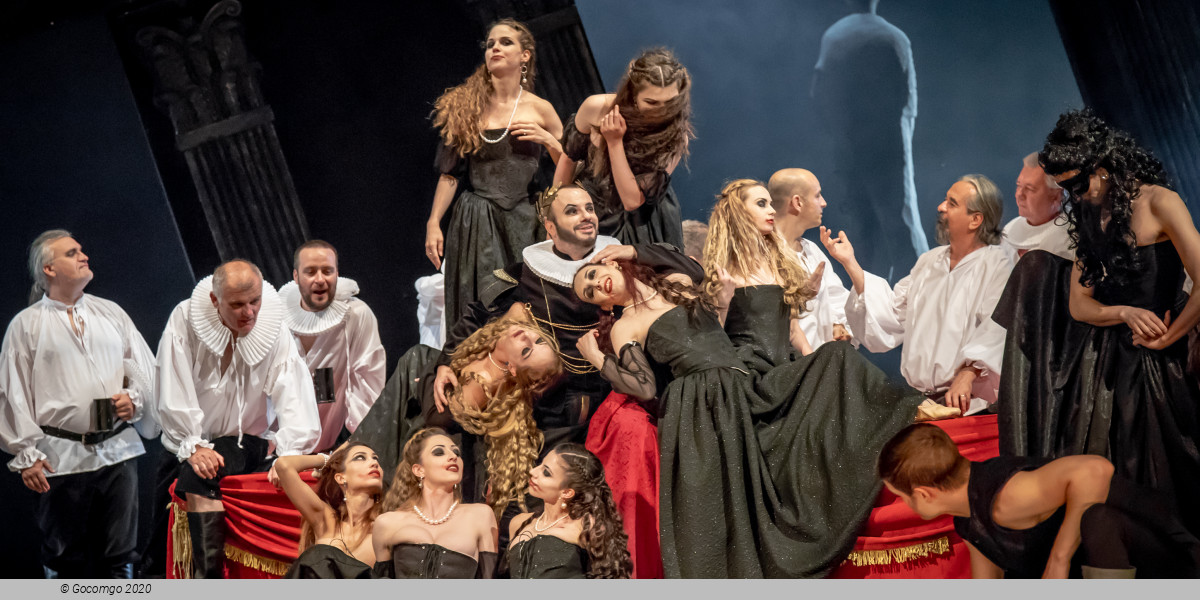
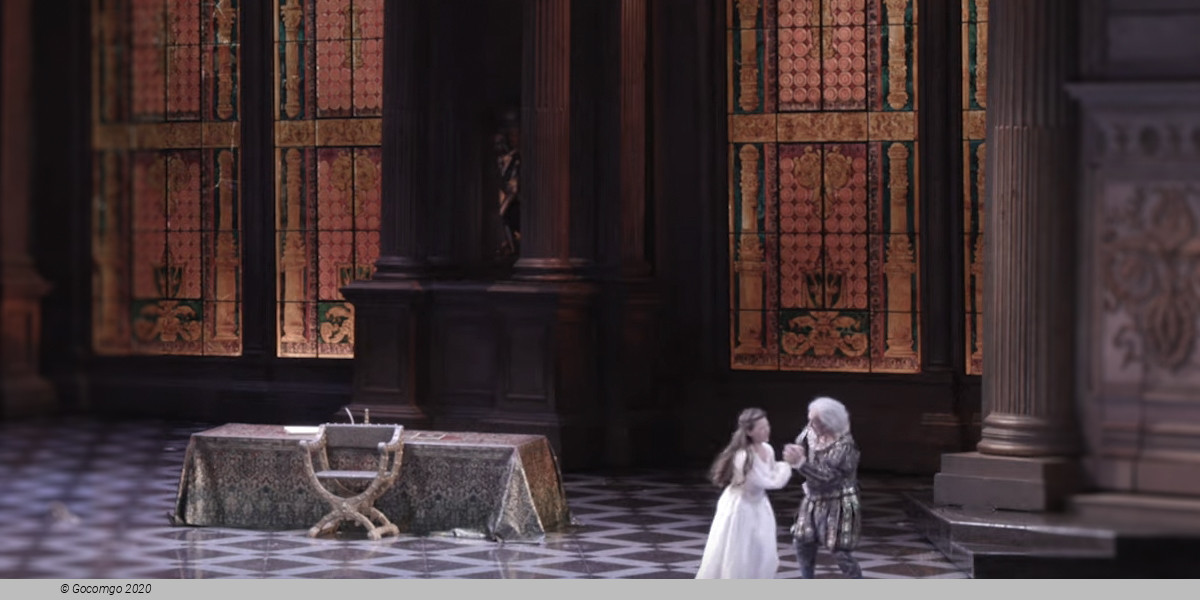
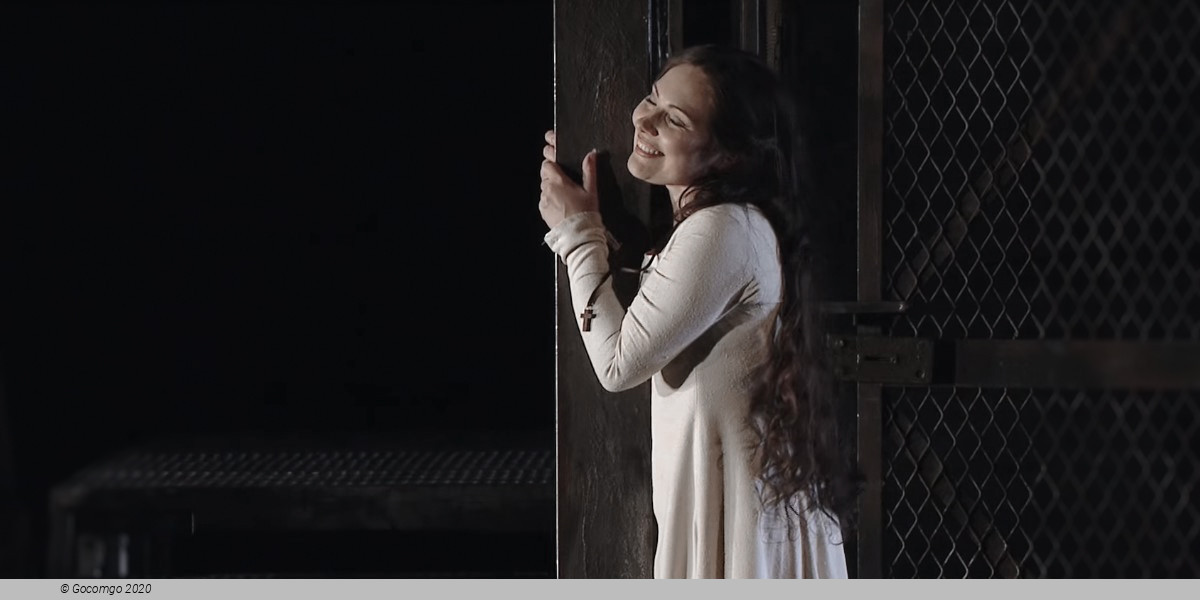
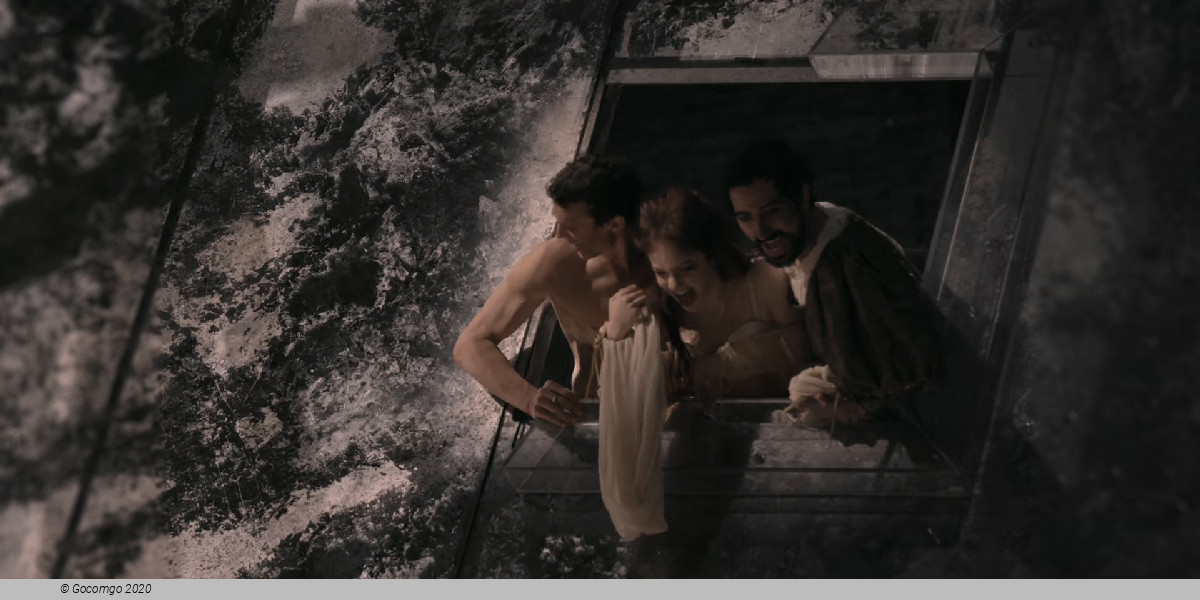
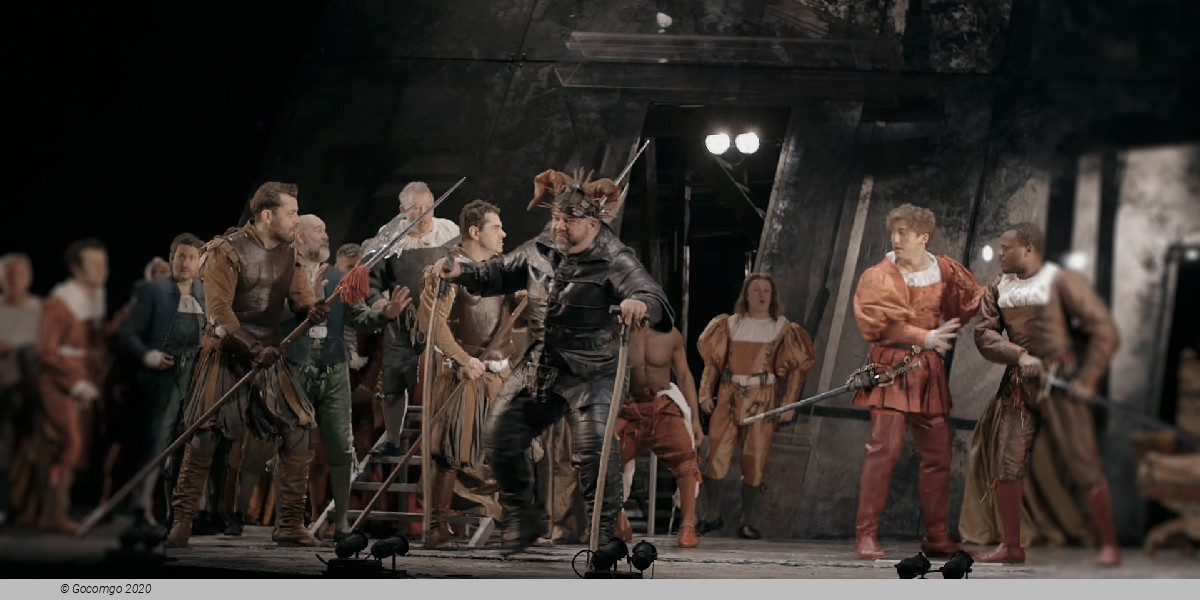
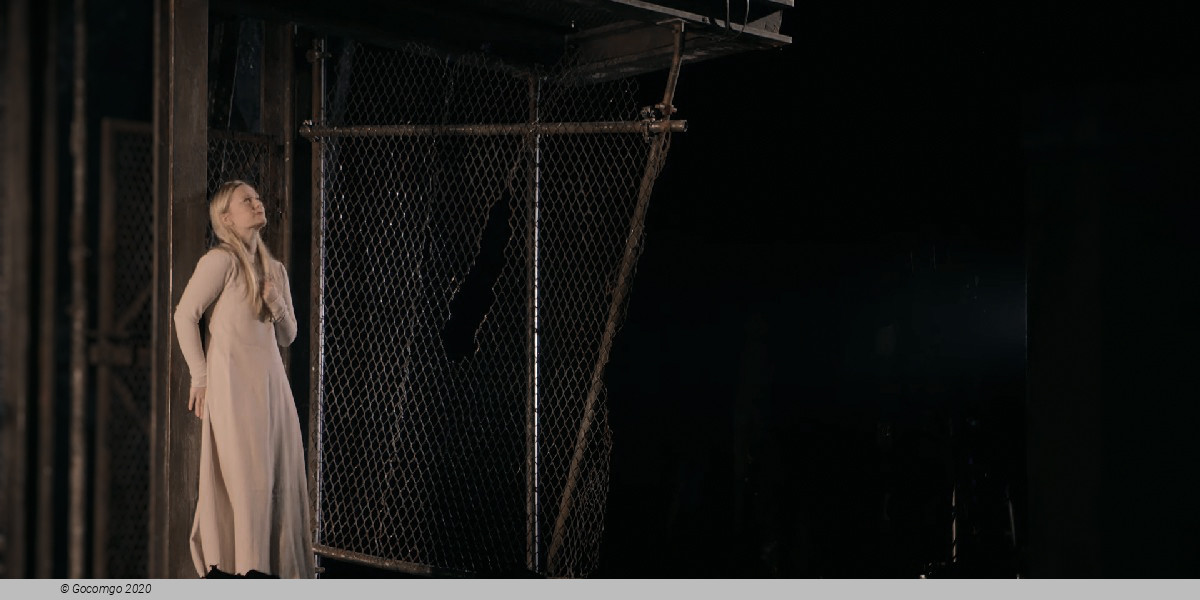
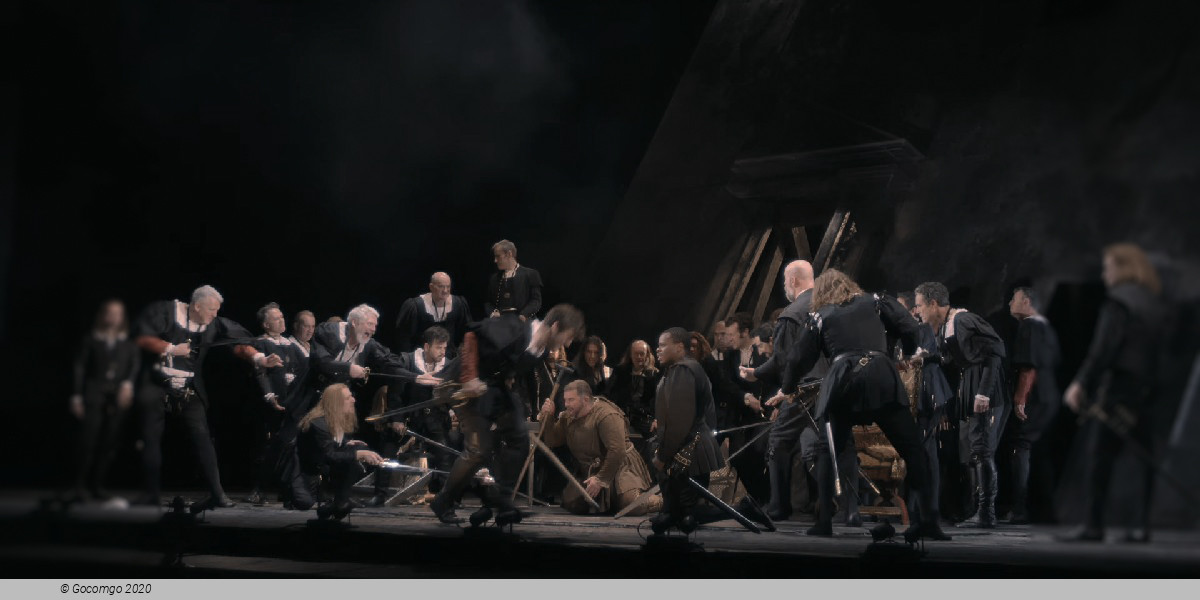
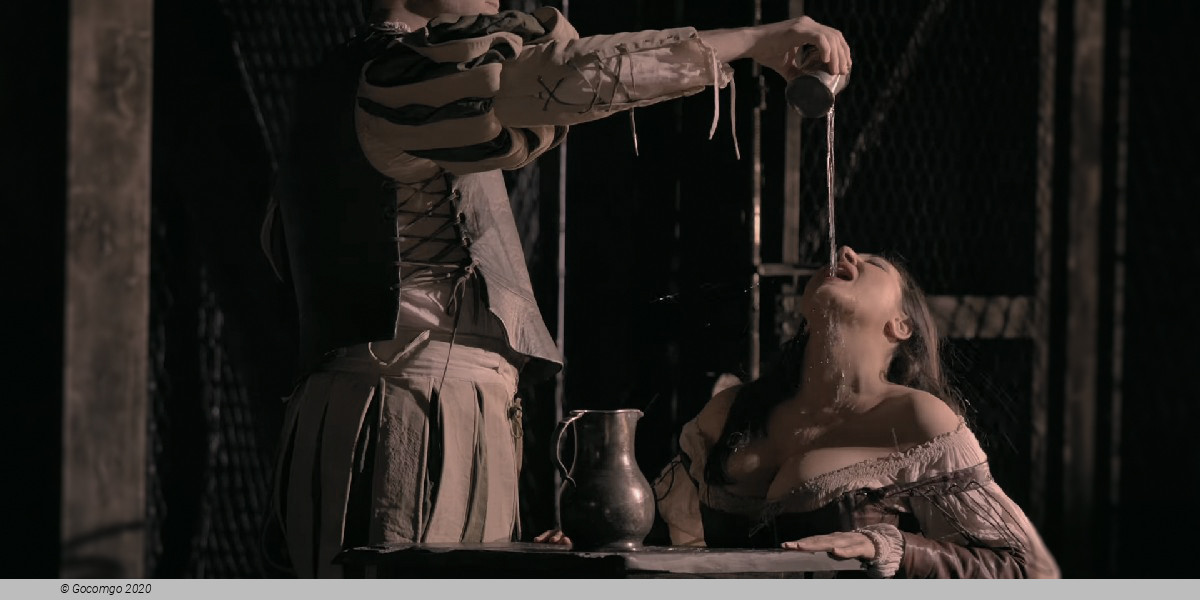
 Theaterplatz 2
Theaterplatz 2